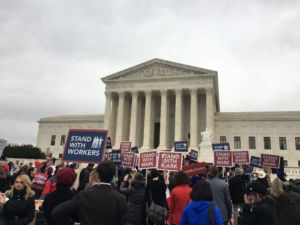Union Organizer Warns of Chaos if Big Labor Loses Janus Case
 It’s never over til it’s over, but big labor has largely conceded its public employee union monopoly through forced dues and fair-share fees will end when the Supreme Court rules on the Janus case that went before the justices last week. Minnesota’s biggest government worker unions–AFSCME, Education Minnesota and MAPE–began taking steps months ago to lock in membership and dues from tens of thousands of members in advance of the decision. American Experiment has written extensively about the questionable tactics of the state’s most powerful public employee union, Education Minnesota, in particular.
It’s never over til it’s over, but big labor has largely conceded its public employee union monopoly through forced dues and fair-share fees will end when the Supreme Court rules on the Janus case that went before the justices last week. Minnesota’s biggest government worker unions–AFSCME, Education Minnesota and MAPE–began taking steps months ago to lock in membership and dues from tens of thousands of members in advance of the decision. American Experiment has written extensively about the questionable tactics of the state’s most powerful public employee union, Education Minnesota, in particular.
RELATED NEWS: Unions Act as if They’ve Lost Already
But union organizer Shaun Richman takes it a step further in a Washington Post column printed in the Star Tribune by issuing what appears to be a not-so-veiled warning of labor’s aggressive reaction if the high court rules as anticipated. Richman presents the current process of coerced fees and dues as a sort of quid pro quo that’s kept the peace with organized labor.
What the Janus backers (and most commentators) miss is that agency fees are not just compensation for the financial costs of representation, but for the political costs of representing all the members in the bargaining unit and maintaining labor peace. As AFSCME’s attorney pointed out in his oral arguments, the agency fee is routinely traded for a no-strike clause in most union contracts. Should those clauses disappear, employers will have chaos and discord on their hands.
Not surprisingly, Richman and the big public employee unions like the current arrangement that provides union bosses with big salaries and millions of dollars for political contributions to their Democratic benefactors. Never mind the trade-off with public employees’ First Amendment rights.
The combination of exclusive union representation, mandatory agency fees, no-strike clauses and “management’s rights” are the foundation of our peculiar labor relations system. No other country structures its labor relations system quite like this. Knock one part out, as the Janus plaintiffs aim to do with agency fees, and the whole system can fall apart. Employers will not like the chaos that this will bring.
Richman predicts the truce between the state and government employees will be out the window if Janus prevails.
If the Supreme Court rules against AFSCME in Janus, many unions will abandon exclusive representation altogether. Their primary motivation will be avoiding the “free rider” problem — being required to expend resources on workers who opt out of paying anything for those services. And new unions will form to compete in that abandoned space.
The solicitor general of Illinois — indirectly a party to the Janus case — warned in Monday’s oral arguments “that when unions are deprived of agency fees, they tend to become more militant, more confrontational.” And AFSCME’s counsel warned about the thousands of contracts that would have to be renegotiated in a climate where an agency fee is no longer a trade for a no-strike pledge, raising “an untold specter of labor unrest throughout the country.”
Richman may well turn out to be right. But we’ve already seen what could be next in our neighboring state of Wisconsin, where the chaos and intimidation tactics of big labor lost out to the rule of law in the long run.